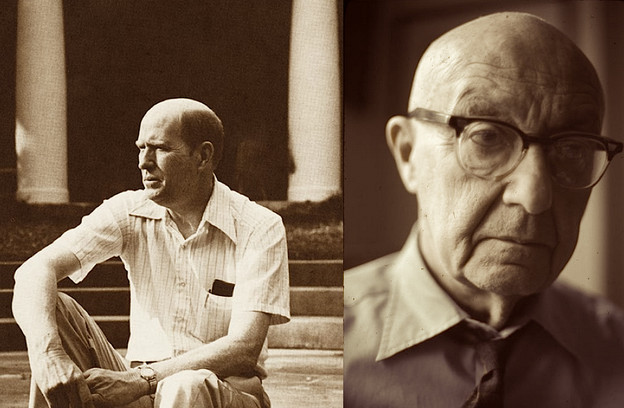Ammons on Rezi: 'Slight artistic interest'

I've been writing about Charles Reznikoff’s Inscriptions, which collected 53 short post-holocaust poems written in the late 1940s to mid-1950s and published finally — self-published by Rezi, actually — in 1959. Reviewers got to it in 1960 and ’61. I came across A. R. Ammons's review in the April 1960 issue of Poetry. Ammons is reviewing Bob Brown's amazing, fabulously unusual 1450-1950, a book published by Jonathan Williams that consists of hand drawings, in a sense reversing the era of the book (marked by the dates of the title) — an avant-garde undoing. Ammons liked the book, although thought of it as a high modernist throwback: “a cool breeze from the Twenties for our hot, dry, thermonuclear times.” Most of the review is taken up by Ammons's assessment of Robert Duncan’s City Lights Selected Poems, and there’s nothing per se wrong with that. But Reznikoff’s Inscriptions deserves more than the 55 words it gets here.
When Ammons turns to Inscriptions, he makes a list of “street scenes in New York” to be found variously in Reznikoff's poems of urban diasporic multi-subjective fragments. Along with two girls in an Automat, an old woman selling newspapers, etc., there is this on Ammons's list: “the alien Jew alienated even from Jews.” One must wonder which of the 53 Inscriptions Ammons meant. Can we find such a hateful or self-hating Jew? Granted, Ammons set aside just a few words in a 400-word review to discuss Reznikoff, and one should not have expected in a contemporary response something on the order of critics' later understanding of profound alienation here, but the pairing of alien (diasporic displacement) and alienation (disaffection) is not a convergence to be found in Reznikoff’s work. To be sure, Ammons’s overall judgment was that these poems were “winning,” yet they were “of slight artistic interest.” It was not a review likely to attract buyers of the self-published volume. In such neglect — and more profoundly, in such misreading of the thematizing purposes of Reznikoff’s plain-seeming aesthetic — could be read in itself a relevant alienation. Milton Hindus in his favorable review of Inscriptions implied the relation between, on one hand, Reznikoff’s “name ha[ving] largely escape the rumor-mongers so that the fact of his accomplishment is almost a secret” and, on the other hand, the deceptive quality of the writing’s “small compass” and the need for “a careful reader.” Robert Franciosi in his later essay “Reading Reznikoff” argued that the central lesson Louis Zukofsky learned from Reznikoff was how to suffer neglect. And George Oppen, writing June Oppen Degnan on May 16, 1960, after exclaiming over Cid Corman’s publication in Japan of the whole (to that point) of Zukofsky’s ‘A,’ expressed concern that verse of such “an extraordinary perfect” verse will be ignored by the mainstream. “People are injured by non-recognition perhaps.” And then Oppen turns to his other colleague: “Maybe even Rezi, in limiting his experience and range. I don’t even know what Rezi would have been if the world had invited him. Possibly less than he is.” Of course Oppen did not mean “limiting” as a criticism. During his reading of Inscriptions he found the poems “overwhelmingly moving.” The limitation was not an effect of misunderstanding’s injury but of the poet’s subject, which — whatever its sources, personal, ethnic, historical — effected a suppression of projection onto survival and thus a de-alienation of the document.
“Slight artistic interest.” That’s an intensely preferential — one might say, given the comment about the alien Jew alienated from Jews, partisan or maybe even prejudicial — view of “interest.” “Interest” for whom?